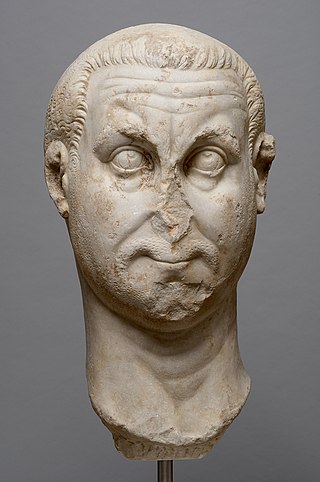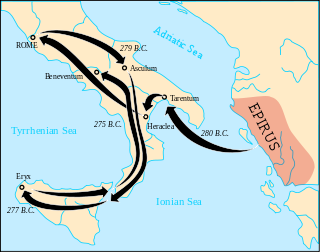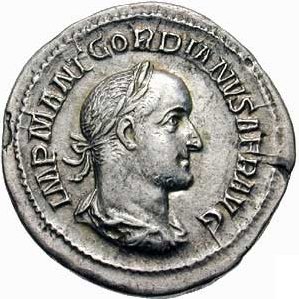Related Research Articles

Marcus Aurelius Severus Alexander, also known as Alexander Severus, was Roman emperor from 222 until 235. The last emperor from the Severan dynasty, he succeeded his slain cousin Elagabalus in 222, at the age of 13. Alexander himself was eventually assassinated, and his death marked the beginning of the events of the Crisis of the Third Century, which included nearly fifty years of civil war, foreign invasion, and the collapse of the monetary economy.

Valerius Licinianus Licinius was Roman emperor from 308 to 324. For most of his reign, he was the colleague and rival of Constantine I, with whom he co-authored the Edict of Milan that granted official toleration to Christians in the Roman Empire. He was finally defeated at the Battle of Chrysopolis, and was later executed on the orders of Constantine I.

Gordian III was Roman emperor from 238 to 244. At the age of 13, he became the youngest sole emperor of the united Roman Empire. Gordian was the son of Antonia Gordiana and Junius Balbus, who died before 238. Antonia Gordiana was the daughter of Emperor Gordian I and younger sister of Emperor Gordian II. Very little is known of his early life before his acclamation. Gordian had assumed the name of his maternal great grandfather in 238.

Gordian I was Roman emperor for 22 days with his son Gordian II in 238, the Year of the Six Emperors. Caught up in a rebellion against the Emperor Maximinus Thrax, he was defeated in battle and committed suicide after the death of his son, having had the shortest reign in imperial history.

Marcus Didius Julianus was Roman emperor from March to June 193, during the Year of the Five Emperors. Julianus had a promising political career, governing several provinces, including Dalmatia and Germania Inferior, and defeated the Chauci and Chatti, two invading Germanic tribes. He was even appointed to the consulship in 175 along with Pertinax as a reward, before being demoted by Commodus. After this demotion, his early, promising political career languished.
The Third Macedonian War was a war fought between the Roman Republic and King Perseus of Macedon. In 179 BC, King Philip V of Macedon died and was succeeded by his ambitious son Perseus. He was anti-Roman and stirred anti-Roman feelings around Macedonia. In 172, a Roman commission visited Perseus and required of him concessions which meant the extinction of his independence. Upon his refusal to comply with the demands they returned home and Rome declared war.
Herodian or Herodianus of Syria, sometimes referred to as "Herodian of Antioch", was a minor Roman civil servant who wrote a colourful history in Greek titled History of the Empire from the Death of Marcus in eight books covering the years 180 to 238. His work is not considered entirely reliable, although his less biased account of Elagabalus may be more useful than that of Cassius Dio. Herodian himself may have been a Syrian, though he appears to have lived for a considerable period of time in Rome, possibly without holding any public office. From his extant work, it seems that he was still living at an advanced age during the reign of Gordianus III, who ascended the throne in 238. Beyond this, nothing is known of his life.
The Illyro-Roman Wars were a series of wars fought between the Roman Republic and the Illyrian kingdom under the Ardiaei and Labeatae. In the First Illyrian War, which lasted from 229 BC to 228 BC, Rome's concern was that the trade across the Adriatic Sea increased after the First Punic War at a time when Ardiaei power increased under queen Teuta. Attacks on trading vessels of Rome's Italic allies by Illyrian pirates and the death of a Roman envoy named Coruncanius on Teuta's orders, prompted the Roman senate to dispatch a Roman army under the command of the consuls Lucius Postumius Albinus and Gnaeus Fulvius Centumalus. Rome expelled Illyrian garrisons from a number of Greek cities including Epidamnus, Apollonia, Corcyra, Pharos and established a protectorate over these Greek towns. The Romans also set up Demetrius of Pharos as a power in Illyria to counterbalance the power of Teuta.

The Pyrrhic War was largely fought between the Roman Republic and Pyrrhus, the king of Epirus, who had been asked by the people of the Greek city of Tarentum in southern Italy to help them in their war against the Romans.

The Battle of Carthage was fought in 238 AD between a Roman army loyal to Emperor Maximinus Thrax and the forces of Emperors Gordian I and Gordian II.

The Year of the Six Emperors was the year AD 238, during which six men made claims to be emperors of Rome. This was an early symptom of what historians now call the Crisis of the Third Century, also known as Military Anarchy or the Imperial Crisis, a period in which the Roman Empire nearly collapsed under the combined pressures of foreign invasions and migrations into the Roman territory, civil wars, peasant rebellions, political instability, Roman reliance on foreign mercenaries known as foederati and commanders nominally working for Rome, the devastating social and economic effects of the plague, debasement of currency, and economic depression. The crisis ended with the ascension of Diocletian and his implementation of reforms in 284.

The Laconian War of 195 BC was fought between the Greek city-state of Sparta and a coalition composed of Rome, the Achaean League, Pergamum, Rhodes, and Macedon.
The siege of Thala, part of the Jugurthine War, was an invasion of the Numidian town of Thala by a Roman army. The Romans were commanded by the proconsul Quintus Caecilius Metellus, the Thalans by an unknown Numidian commander. The Romans' main objective was to capture the Numidian king Jugurtha who was reported to be in Thala, but he escaped before the legions reached the fortress town. Metellus then besieged the town to get hold of one of Jugurtha's treasuries which was stored in Thala. The fortress town was besieged for forty days after which most of its inhabitants committed suicide by setting fire to the town.

Maximinus Thrax was a Roman emperor from 235 to 238. Born of Thracian origin – giving the nickname "Thrax" – he rose up through the military ranks, ultimately holding high command in the army of the Rhine under Emperor Severus Alexander. After Severus was murdered in 235, he was proclaimed emperor by the army, beginning the Crisis of the Third Century.
The siege of Aquileia was a siege battle that took place in 238 in the town of Aquileia during the Year of the Six Emperors, which resulted in the assassination of Maximinus Thrax.
Tullus Menophilus was a Roman Senator and General who led the defense at the Siege of Aquileia along with Rutilius Pudens Crispinus.
The siege of the fortress at Muluccha, part of the Jugurthine War, was an investment of a Jugurthine fortress by a Roman army in 106 BC. The Romans were commanded by Gaius Marius, the Numidians by an unknown commander. The Romans' main objective was to capture one of king Jugurtha's treasuries which was reported to be inside the fortress. Marius besieged the fortress town and finally took it by trickery.
The siege of Zama, part of the Jugurthine War, was an investment of the Numidian town of Zama by a Roman army. The Romans were commanded by Quintus Caecilius Metellus, one of the consuls of 109 BC, while the Numidians were under the overall command of Jugurtha, the king of Numidia. The Romans' main objective was to lure Jugurtha into a set-piece battle; the Numidians had been wearing down the Roman legions by guerilla warfare and the Roman commander hoped the siege would pressure the Numidian king into giving battle. Jugurtha did not let himself be goaded into a pitched battle and kept up his opportune attacks while the defenders of Zama kept the Romans at bay. Failing to take the city and failing to provoke the Numidian king into entering a set-piece battle, the Romans gave up on the siege and marched back to the Roman province of Africa.

The siege of Brundisium was an early military confrontation of Caesar's Civil War. Taking place in March 49 BC, it saw the forces of Gaius Julius Caesar's Populares besiege the Italian city of Brundisium on the coast of the Adriatic Sea which was held by a force of Optimates under the command of Gnaeus Pompeius Magnus. After a series of brief skirmishes, during which Caesar tried to blockade the harbour, Pompey abandoned the city and managed to evacuate his men across the Adriatic to Epirus. Pompey's retreat meant that Caesar had full control over the Italian Peninsula, with no way to pursue Pompey's forces in the east he instead decided to head west to confront the legions Pompey had stationed in Hispania.

Roman Aquileia was founded in 181 BC by the Romans, in the territory of the ancient Carni:
In the same year 181 BC the colony of Aquileia was deducted in the territory of the Gauls. 3 000 infantrymen received 50 iugera each, the centurions 100, the horsemen 140. The triumvirs who founded the colony were Publius Scipio Nasica, Gaius Flaminius, and Lucius Manlius Acidinus.
References
- ↑ Herodian, Roman History accessed 2 May 2015
- ↑ REMARKS ON THE CAREER OF RUTILIUS PUDENS CRISPINUS by Danuta Okon Studia Europaea Gnesnensia 2012 accessed 2 May 2015
- ↑ Herodian, "Roman History 8.3" accessed 2 May 2015